Comparative Analysis of Feminist and Cognitive Behavioral Theories
VerifiedAdded on 2023/01/18
|8
|3018
|89
Report
AI Summary
This report delves into two prominent counseling theories: feminist therapy and cognitive behavioral therapy (CBT). It begins by defining feminist therapy, emphasizing its gender-based approach to address challenges faced by women, focusing on empowerment and understanding the social factors influencing mental stability. The report explores its evolution, applications across diverse populations, and therapeutic tools like role-playing. It then examines the strengths, such as recognizing the impact of social norms and empowering clients, and weaknesses, including potential for generalization and overlooking biological differences. The report then transitions to CBT, detailing its focus on the interplay of thoughts, feelings, and behaviors to modify negative thought patterns and reduce distress. It outlines the core principles, including the role of automatic thoughts and cognitive distortions, as well as the techniques used to help individuals develop new ways of thinking and acting. The report highlights the strengths of CBT, such as its practical implementation and effectiveness in treating depression, while also acknowledging its weaknesses, including its reliance on interference and potential limitations in addressing underlying behavioral patterns. Finally, the report provides a comparative analysis of both therapies, outlining the reasons for selecting each approach and their unique contributions to the field of counseling.
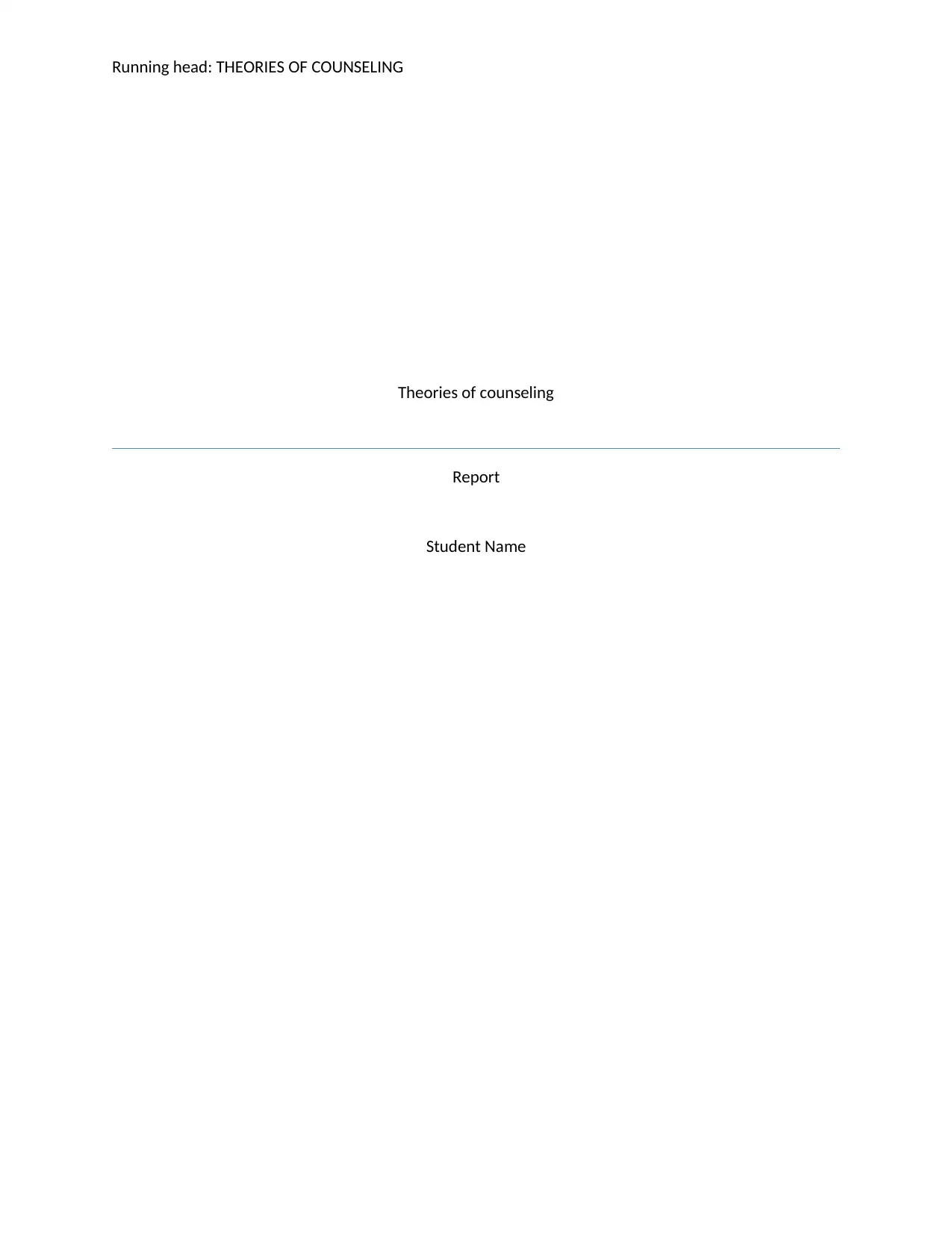
Running head: THEORIES OF COUNSELING
Theories of counseling
Report
Student Name
Theories of counseling
Report
Student Name
Paraphrase This Document
Need a fresh take? Get an instant paraphrase of this document with our AI Paraphraser
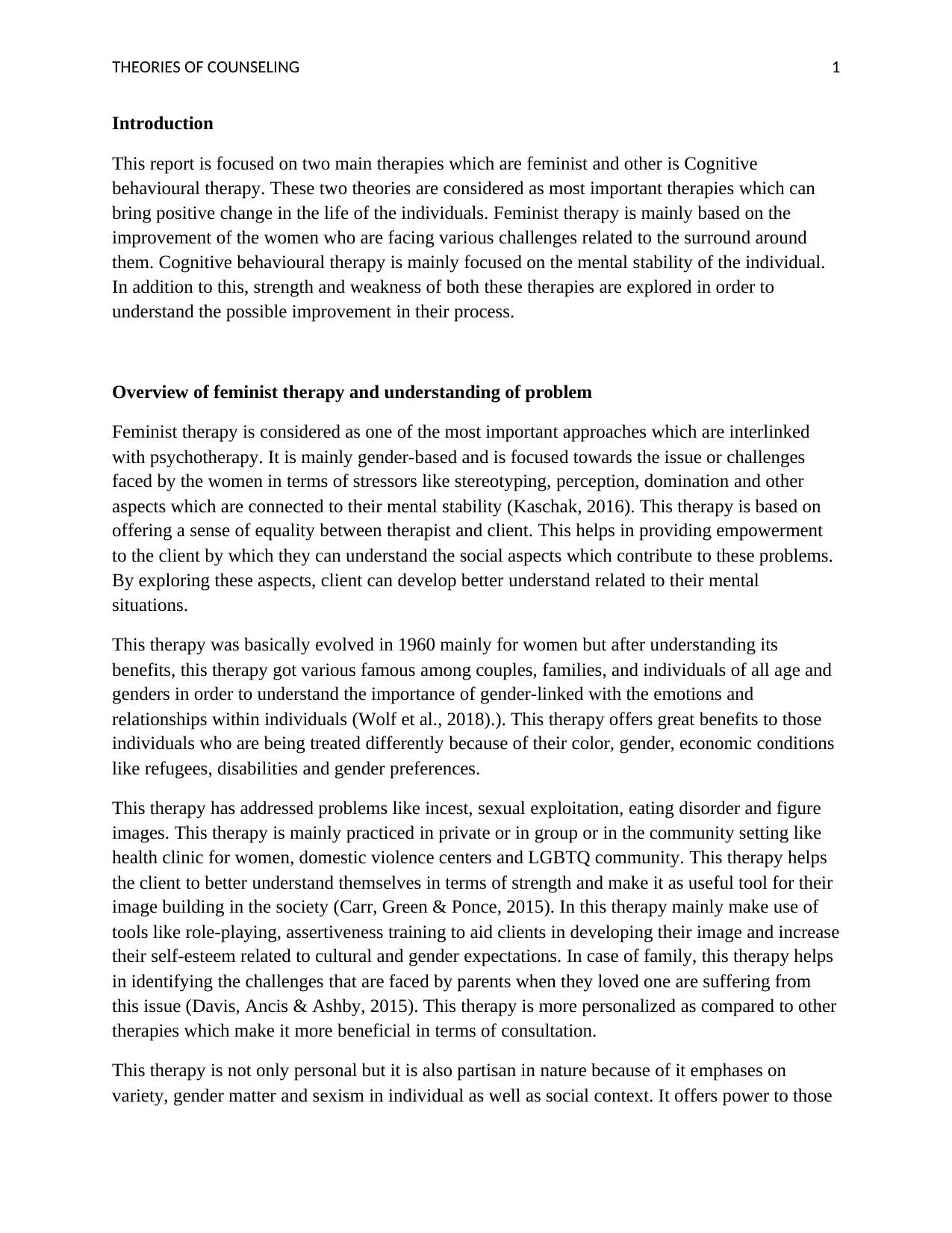
THEORIES OF COUNSELING 1
Introduction
This report is focused on two main therapies which are feminist and other is Cognitive
behavioural therapy. These two theories are considered as most important therapies which can
bring positive change in the life of the individuals. Feminist therapy is mainly based on the
improvement of the women who are facing various challenges related to the surround around
them. Cognitive behavioural therapy is mainly focused on the mental stability of the individual.
In addition to this, strength and weakness of both these therapies are explored in order to
understand the possible improvement in their process.
Overview of feminist therapy and understanding of problem
Feminist therapy is considered as one of the most important approaches which are interlinked
with psychotherapy. It is mainly gender-based and is focused towards the issue or challenges
faced by the women in terms of stressors like stereotyping, perception, domination and other
aspects which are connected to their mental stability (Kaschak, 2016). This therapy is based on
offering a sense of equality between therapist and client. This helps in providing empowerment
to the client by which they can understand the social aspects which contribute to these problems.
By exploring these aspects, client can develop better understand related to their mental
situations.
This therapy was basically evolved in 1960 mainly for women but after understanding its
benefits, this therapy got various famous among couples, families, and individuals of all age and
genders in order to understand the importance of gender-linked with the emotions and
relationships within individuals (Wolf et al., 2018).). This therapy offers great benefits to those
individuals who are being treated differently because of their color, gender, economic conditions
like refugees, disabilities and gender preferences.
This therapy has addressed problems like incest, sexual exploitation, eating disorder and figure
images. This therapy is mainly practiced in private or in group or in the community setting like
health clinic for women, domestic violence centers and LGBTQ community. This therapy helps
the client to better understand themselves in terms of strength and make it as useful tool for their
image building in the society (Carr, Green & Ponce, 2015). In this therapy mainly make use of
tools like role-playing, assertiveness training to aid clients in developing their image and increase
their self-esteem related to cultural and gender expectations. In case of family, this therapy helps
in identifying the challenges that are faced by parents when they loved one are suffering from
this issue (Davis, Ancis & Ashby, 2015). This therapy is more personalized as compared to other
therapies which make it more beneficial in terms of consultation.
This therapy is not only personal but it is also partisan in nature because of it emphases on
variety, gender matter and sexism in individual as well as social context. It offers power to those
Introduction
This report is focused on two main therapies which are feminist and other is Cognitive
behavioural therapy. These two theories are considered as most important therapies which can
bring positive change in the life of the individuals. Feminist therapy is mainly based on the
improvement of the women who are facing various challenges related to the surround around
them. Cognitive behavioural therapy is mainly focused on the mental stability of the individual.
In addition to this, strength and weakness of both these therapies are explored in order to
understand the possible improvement in their process.
Overview of feminist therapy and understanding of problem
Feminist therapy is considered as one of the most important approaches which are interlinked
with psychotherapy. It is mainly gender-based and is focused towards the issue or challenges
faced by the women in terms of stressors like stereotyping, perception, domination and other
aspects which are connected to their mental stability (Kaschak, 2016). This therapy is based on
offering a sense of equality between therapist and client. This helps in providing empowerment
to the client by which they can understand the social aspects which contribute to these problems.
By exploring these aspects, client can develop better understand related to their mental
situations.
This therapy was basically evolved in 1960 mainly for women but after understanding its
benefits, this therapy got various famous among couples, families, and individuals of all age and
genders in order to understand the importance of gender-linked with the emotions and
relationships within individuals (Wolf et al., 2018).). This therapy offers great benefits to those
individuals who are being treated differently because of their color, gender, economic conditions
like refugees, disabilities and gender preferences.
This therapy has addressed problems like incest, sexual exploitation, eating disorder and figure
images. This therapy is mainly practiced in private or in group or in the community setting like
health clinic for women, domestic violence centers and LGBTQ community. This therapy helps
the client to better understand themselves in terms of strength and make it as useful tool for their
image building in the society (Carr, Green & Ponce, 2015). In this therapy mainly make use of
tools like role-playing, assertiveness training to aid clients in developing their image and increase
their self-esteem related to cultural and gender expectations. In case of family, this therapy helps
in identifying the challenges that are faced by parents when they loved one are suffering from
this issue (Davis, Ancis & Ashby, 2015). This therapy is more personalized as compared to other
therapies which make it more beneficial in terms of consultation.
This therapy is not only personal but it is also partisan in nature because of it emphases on
variety, gender matter and sexism in individual as well as social context. It offers power to those
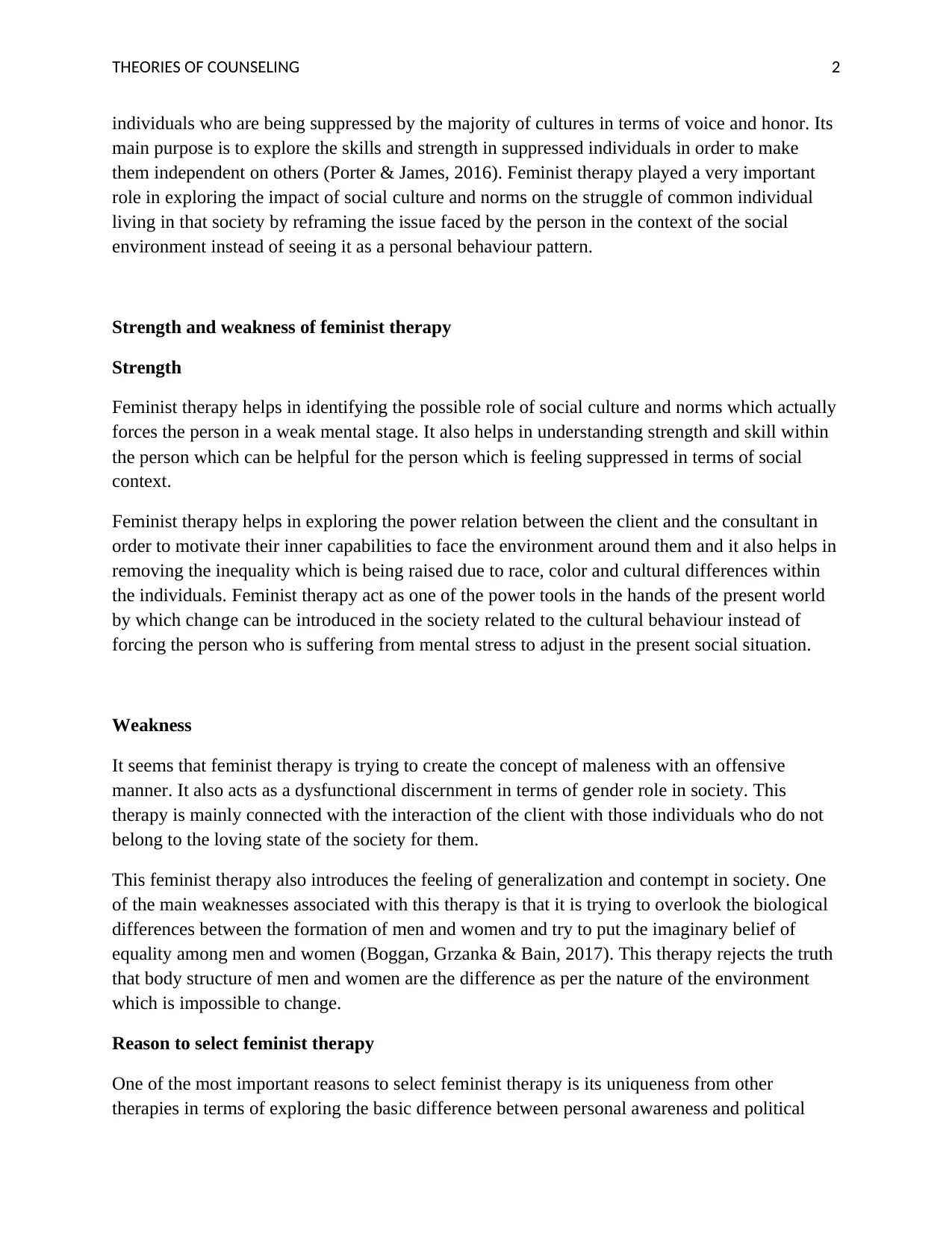
THEORIES OF COUNSELING 2
individuals who are being suppressed by the majority of cultures in terms of voice and honor. Its
main purpose is to explore the skills and strength in suppressed individuals in order to make
them independent on others (Porter & James, 2016). Feminist therapy played a very important
role in exploring the impact of social culture and norms on the struggle of common individual
living in that society by reframing the issue faced by the person in the context of the social
environment instead of seeing it as a personal behaviour pattern.
Strength and weakness of feminist therapy
Strength
Feminist therapy helps in identifying the possible role of social culture and norms which actually
forces the person in a weak mental stage. It also helps in understanding strength and skill within
the person which can be helpful for the person which is feeling suppressed in terms of social
context.
Feminist therapy helps in exploring the power relation between the client and the consultant in
order to motivate their inner capabilities to face the environment around them and it also helps in
removing the inequality which is being raised due to race, color and cultural differences within
the individuals. Feminist therapy act as one of the power tools in the hands of the present world
by which change can be introduced in the society related to the cultural behaviour instead of
forcing the person who is suffering from mental stress to adjust in the present social situation.
Weakness
It seems that feminist therapy is trying to create the concept of maleness with an offensive
manner. It also acts as a dysfunctional discernment in terms of gender role in society. This
therapy is mainly connected with the interaction of the client with those individuals who do not
belong to the loving state of the society for them.
This feminist therapy also introduces the feeling of generalization and contempt in society. One
of the main weaknesses associated with this therapy is that it is trying to overlook the biological
differences between the formation of men and women and try to put the imaginary belief of
equality among men and women (Boggan, Grzanka & Bain, 2017). This therapy rejects the truth
that body structure of men and women are the difference as per the nature of the environment
which is impossible to change.
Reason to select feminist therapy
One of the most important reasons to select feminist therapy is its uniqueness from other
therapies in terms of exploring the basic difference between personal awareness and political
individuals who are being suppressed by the majority of cultures in terms of voice and honor. Its
main purpose is to explore the skills and strength in suppressed individuals in order to make
them independent on others (Porter & James, 2016). Feminist therapy played a very important
role in exploring the impact of social culture and norms on the struggle of common individual
living in that society by reframing the issue faced by the person in the context of the social
environment instead of seeing it as a personal behaviour pattern.
Strength and weakness of feminist therapy
Strength
Feminist therapy helps in identifying the possible role of social culture and norms which actually
forces the person in a weak mental stage. It also helps in understanding strength and skill within
the person which can be helpful for the person which is feeling suppressed in terms of social
context.
Feminist therapy helps in exploring the power relation between the client and the consultant in
order to motivate their inner capabilities to face the environment around them and it also helps in
removing the inequality which is being raised due to race, color and cultural differences within
the individuals. Feminist therapy act as one of the power tools in the hands of the present world
by which change can be introduced in the society related to the cultural behaviour instead of
forcing the person who is suffering from mental stress to adjust in the present social situation.
Weakness
It seems that feminist therapy is trying to create the concept of maleness with an offensive
manner. It also acts as a dysfunctional discernment in terms of gender role in society. This
therapy is mainly connected with the interaction of the client with those individuals who do not
belong to the loving state of the society for them.
This feminist therapy also introduces the feeling of generalization and contempt in society. One
of the main weaknesses associated with this therapy is that it is trying to overlook the biological
differences between the formation of men and women and try to put the imaginary belief of
equality among men and women (Boggan, Grzanka & Bain, 2017). This therapy rejects the truth
that body structure of men and women are the difference as per the nature of the environment
which is impossible to change.
Reason to select feminist therapy
One of the most important reasons to select feminist therapy is its uniqueness from other
therapies in terms of exploring the basic difference between personal awareness and political
⊘ This is a preview!⊘
Do you want full access?
Subscribe today to unlock all pages.

Trusted by 1+ million students worldwide
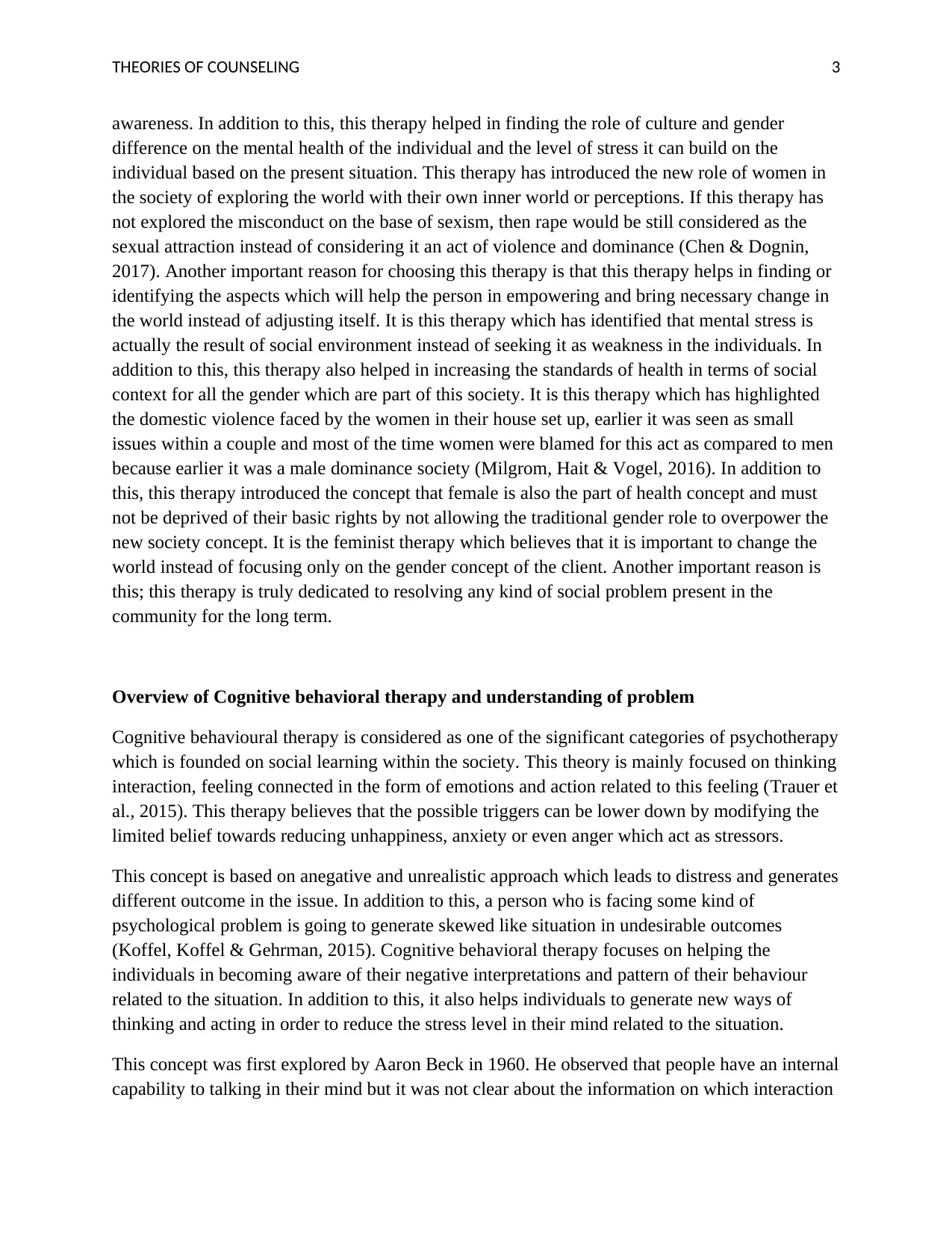
THEORIES OF COUNSELING 3
awareness. In addition to this, this therapy helped in finding the role of culture and gender
difference on the mental health of the individual and the level of stress it can build on the
individual based on the present situation. This therapy has introduced the new role of women in
the society of exploring the world with their own inner world or perceptions. If this therapy has
not explored the misconduct on the base of sexism, then rape would be still considered as the
sexual attraction instead of considering it an act of violence and dominance (Chen & Dognin,
2017). Another important reason for choosing this therapy is that this therapy helps in finding or
identifying the aspects which will help the person in empowering and bring necessary change in
the world instead of adjusting itself. It is this therapy which has identified that mental stress is
actually the result of social environment instead of seeking it as weakness in the individuals. In
addition to this, this therapy also helped in increasing the standards of health in terms of social
context for all the gender which are part of this society. It is this therapy which has highlighted
the domestic violence faced by the women in their house set up, earlier it was seen as small
issues within a couple and most of the time women were blamed for this act as compared to men
because earlier it was a male dominance society (Milgrom, Hait & Vogel, 2016). In addition to
this, this therapy introduced the concept that female is also the part of health concept and must
not be deprived of their basic rights by not allowing the traditional gender role to overpower the
new society concept. It is the feminist therapy which believes that it is important to change the
world instead of focusing only on the gender concept of the client. Another important reason is
this; this therapy is truly dedicated to resolving any kind of social problem present in the
community for the long term.
Overview of Cognitive behavioral therapy and understanding of problem
Cognitive behavioural therapy is considered as one of the significant categories of psychotherapy
which is founded on social learning within the society. This theory is mainly focused on thinking
interaction, feeling connected in the form of emotions and action related to this feeling (Trauer et
al., 2015). This therapy believes that the possible triggers can be lower down by modifying the
limited belief towards reducing unhappiness, anxiety or even anger which act as stressors.
This concept is based on anegative and unrealistic approach which leads to distress and generates
different outcome in the issue. In addition to this, a person who is facing some kind of
psychological problem is going to generate skewed like situation in undesirable outcomes
(Koffel, Koffel & Gehrman, 2015). Cognitive behavioral therapy focuses on helping the
individuals in becoming aware of their negative interpretations and pattern of their behaviour
related to the situation. In addition to this, it also helps individuals to generate new ways of
thinking and acting in order to reduce the stress level in their mind related to the situation.
This concept was first explored by Aaron Beck in 1960. He observed that people have an internal
capability to talking in their mind but it was not clear about the information on which interaction
awareness. In addition to this, this therapy helped in finding the role of culture and gender
difference on the mental health of the individual and the level of stress it can build on the
individual based on the present situation. This therapy has introduced the new role of women in
the society of exploring the world with their own inner world or perceptions. If this therapy has
not explored the misconduct on the base of sexism, then rape would be still considered as the
sexual attraction instead of considering it an act of violence and dominance (Chen & Dognin,
2017). Another important reason for choosing this therapy is that this therapy helps in finding or
identifying the aspects which will help the person in empowering and bring necessary change in
the world instead of adjusting itself. It is this therapy which has identified that mental stress is
actually the result of social environment instead of seeking it as weakness in the individuals. In
addition to this, this therapy also helped in increasing the standards of health in terms of social
context for all the gender which are part of this society. It is this therapy which has highlighted
the domestic violence faced by the women in their house set up, earlier it was seen as small
issues within a couple and most of the time women were blamed for this act as compared to men
because earlier it was a male dominance society (Milgrom, Hait & Vogel, 2016). In addition to
this, this therapy introduced the concept that female is also the part of health concept and must
not be deprived of their basic rights by not allowing the traditional gender role to overpower the
new society concept. It is the feminist therapy which believes that it is important to change the
world instead of focusing only on the gender concept of the client. Another important reason is
this; this therapy is truly dedicated to resolving any kind of social problem present in the
community for the long term.
Overview of Cognitive behavioral therapy and understanding of problem
Cognitive behavioural therapy is considered as one of the significant categories of psychotherapy
which is founded on social learning within the society. This theory is mainly focused on thinking
interaction, feeling connected in the form of emotions and action related to this feeling (Trauer et
al., 2015). This therapy believes that the possible triggers can be lower down by modifying the
limited belief towards reducing unhappiness, anxiety or even anger which act as stressors.
This concept is based on anegative and unrealistic approach which leads to distress and generates
different outcome in the issue. In addition to this, a person who is facing some kind of
psychological problem is going to generate skewed like situation in undesirable outcomes
(Koffel, Koffel & Gehrman, 2015). Cognitive behavioral therapy focuses on helping the
individuals in becoming aware of their negative interpretations and pattern of their behaviour
related to the situation. In addition to this, it also helps individuals to generate new ways of
thinking and acting in order to reduce the stress level in their mind related to the situation.
This concept was first explored by Aaron Beck in 1960. He observed that people have an internal
capability to talking in their mind but it was not clear about the information on which interaction
Paraphrase This Document
Need a fresh take? Get an instant paraphrase of this document with our AI Paraphraser
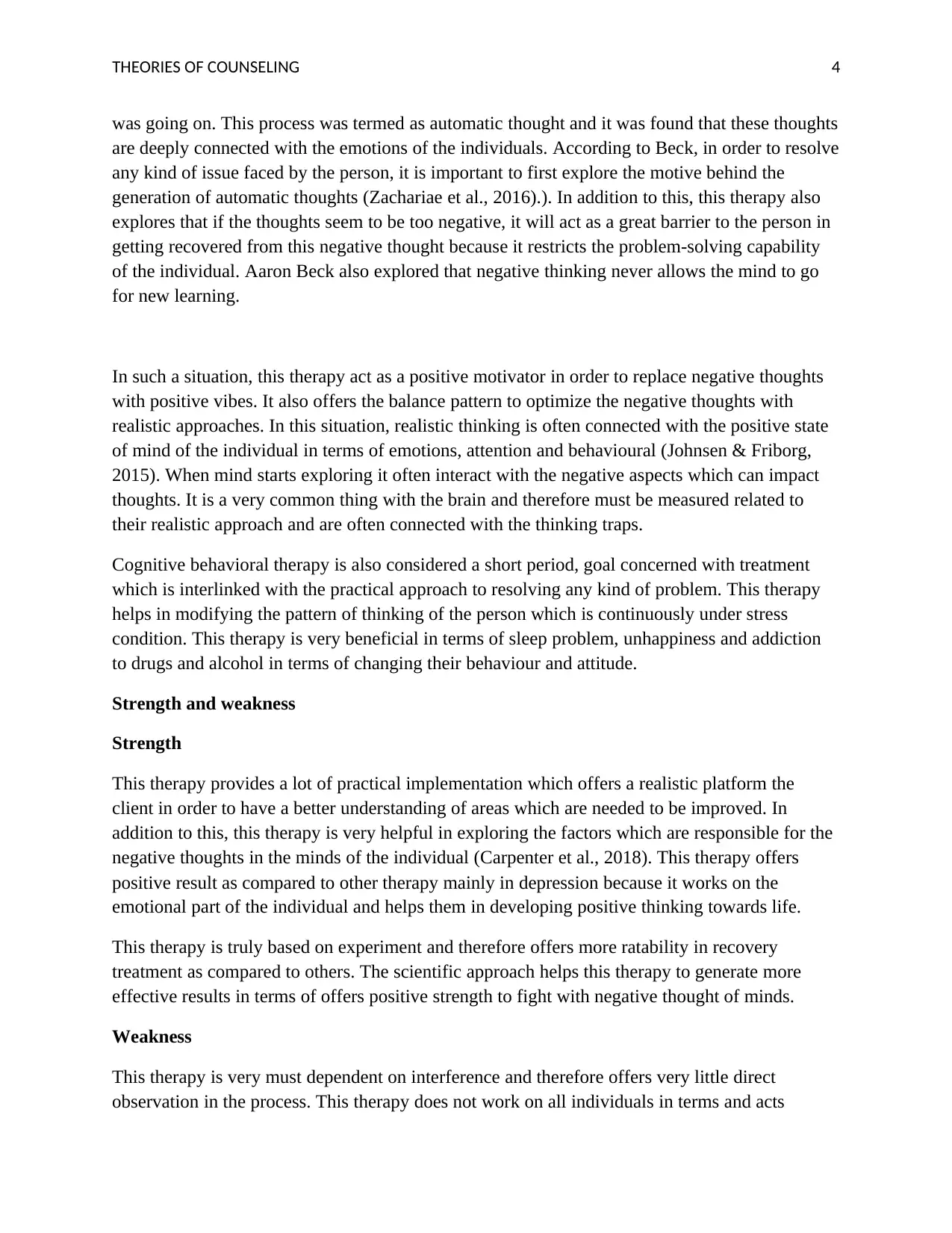
THEORIES OF COUNSELING 4
was going on. This process was termed as automatic thought and it was found that these thoughts
are deeply connected with the emotions of the individuals. According to Beck, in order to resolve
any kind of issue faced by the person, it is important to first explore the motive behind the
generation of automatic thoughts (Zachariae et al., 2016).). In addition to this, this therapy also
explores that if the thoughts seem to be too negative, it will act as a great barrier to the person in
getting recovered from this negative thought because it restricts the problem-solving capability
of the individual. Aaron Beck also explored that negative thinking never allows the mind to go
for new learning.
In such a situation, this therapy act as a positive motivator in order to replace negative thoughts
with positive vibes. It also offers the balance pattern to optimize the negative thoughts with
realistic approaches. In this situation, realistic thinking is often connected with the positive state
of mind of the individual in terms of emotions, attention and behavioural (Johnsen & Friborg,
2015). When mind starts exploring it often interact with the negative aspects which can impact
thoughts. It is a very common thing with the brain and therefore must be measured related to
their realistic approach and are often connected with the thinking traps.
Cognitive behavioral therapy is also considered a short period, goal concerned with treatment
which is interlinked with the practical approach to resolving any kind of problem. This therapy
helps in modifying the pattern of thinking of the person which is continuously under stress
condition. This therapy is very beneficial in terms of sleep problem, unhappiness and addiction
to drugs and alcohol in terms of changing their behaviour and attitude.
Strength and weakness
Strength
This therapy provides a lot of practical implementation which offers a realistic platform the
client in order to have a better understanding of areas which are needed to be improved. In
addition to this, this therapy is very helpful in exploring the factors which are responsible for the
negative thoughts in the minds of the individual (Carpenter et al., 2018). This therapy offers
positive result as compared to other therapy mainly in depression because it works on the
emotional part of the individual and helps them in developing positive thinking towards life.
This therapy is truly based on experiment and therefore offers more ratability in recovery
treatment as compared to others. The scientific approach helps this therapy to generate more
effective results in terms of offers positive strength to fight with negative thought of minds.
Weakness
This therapy is very must dependent on interference and therefore offers very little direct
observation in the process. This therapy does not work on all individuals in terms and acts
was going on. This process was termed as automatic thought and it was found that these thoughts
are deeply connected with the emotions of the individuals. According to Beck, in order to resolve
any kind of issue faced by the person, it is important to first explore the motive behind the
generation of automatic thoughts (Zachariae et al., 2016).). In addition to this, this therapy also
explores that if the thoughts seem to be too negative, it will act as a great barrier to the person in
getting recovered from this negative thought because it restricts the problem-solving capability
of the individual. Aaron Beck also explored that negative thinking never allows the mind to go
for new learning.
In such a situation, this therapy act as a positive motivator in order to replace negative thoughts
with positive vibes. It also offers the balance pattern to optimize the negative thoughts with
realistic approaches. In this situation, realistic thinking is often connected with the positive state
of mind of the individual in terms of emotions, attention and behavioural (Johnsen & Friborg,
2015). When mind starts exploring it often interact with the negative aspects which can impact
thoughts. It is a very common thing with the brain and therefore must be measured related to
their realistic approach and are often connected with the thinking traps.
Cognitive behavioral therapy is also considered a short period, goal concerned with treatment
which is interlinked with the practical approach to resolving any kind of problem. This therapy
helps in modifying the pattern of thinking of the person which is continuously under stress
condition. This therapy is very beneficial in terms of sleep problem, unhappiness and addiction
to drugs and alcohol in terms of changing their behaviour and attitude.
Strength and weakness
Strength
This therapy provides a lot of practical implementation which offers a realistic platform the
client in order to have a better understanding of areas which are needed to be improved. In
addition to this, this therapy is very helpful in exploring the factors which are responsible for the
negative thoughts in the minds of the individual (Carpenter et al., 2018). This therapy offers
positive result as compared to other therapy mainly in depression because it works on the
emotional part of the individual and helps them in developing positive thinking towards life.
This therapy is truly based on experiment and therefore offers more ratability in recovery
treatment as compared to others. The scientific approach helps this therapy to generate more
effective results in terms of offers positive strength to fight with negative thought of minds.
Weakness
This therapy is very must dependent on interference and therefore offers very little direct
observation in the process. This therapy does not work on all individuals in terms and acts
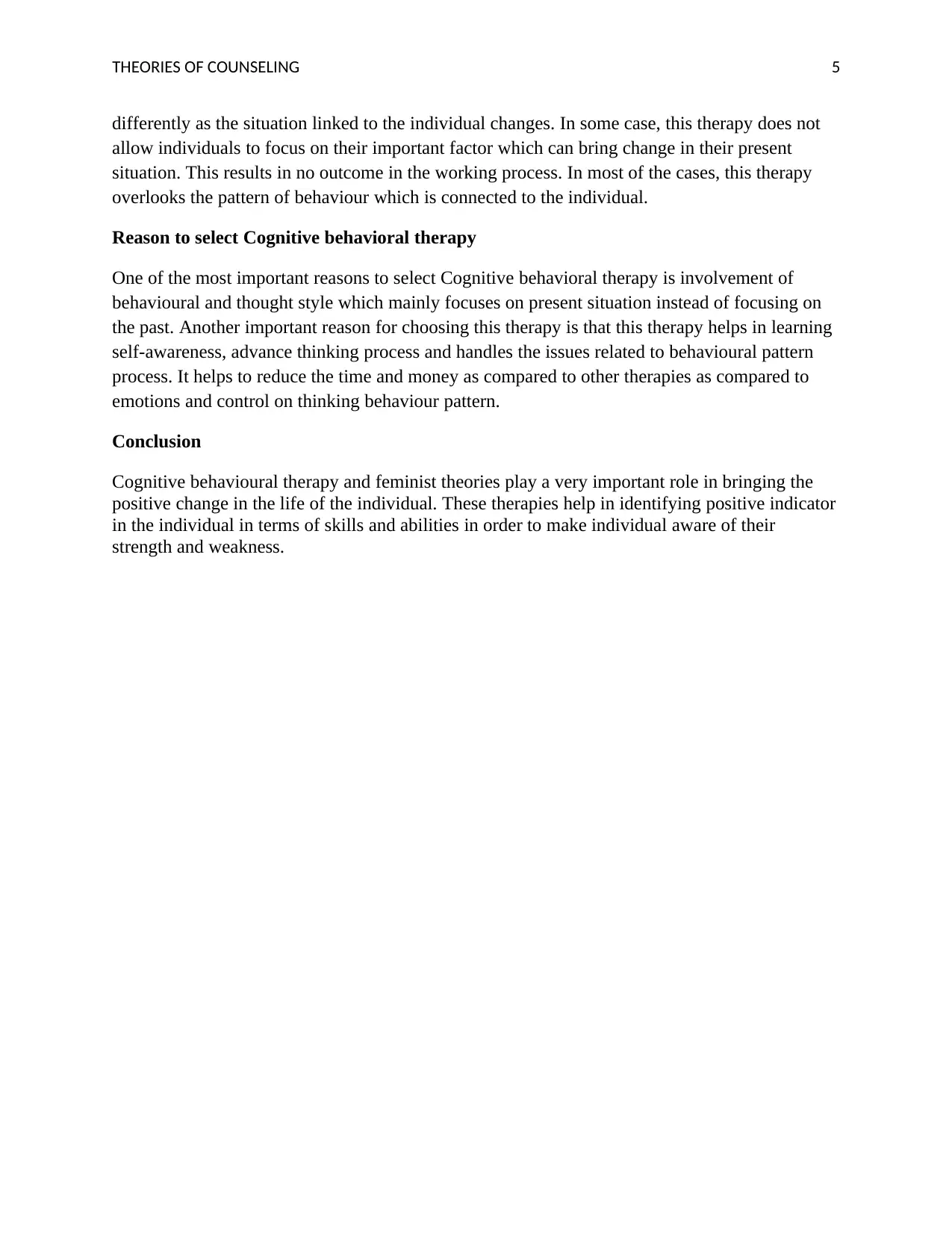
THEORIES OF COUNSELING 5
differently as the situation linked to the individual changes. In some case, this therapy does not
allow individuals to focus on their important factor which can bring change in their present
situation. This results in no outcome in the working process. In most of the cases, this therapy
overlooks the pattern of behaviour which is connected to the individual.
Reason to select Cognitive behavioral therapy
One of the most important reasons to select Cognitive behavioral therapy is involvement of
behavioural and thought style which mainly focuses on present situation instead of focusing on
the past. Another important reason for choosing this therapy is that this therapy helps in learning
self-awareness, advance thinking process and handles the issues related to behavioural pattern
process. It helps to reduce the time and money as compared to other therapies as compared to
emotions and control on thinking behaviour pattern.
Conclusion
Cognitive behavioural therapy and feminist theories play a very important role in bringing the
positive change in the life of the individual. These therapies help in identifying positive indicator
in the individual in terms of skills and abilities in order to make individual aware of their
strength and weakness.
differently as the situation linked to the individual changes. In some case, this therapy does not
allow individuals to focus on their important factor which can bring change in their present
situation. This results in no outcome in the working process. In most of the cases, this therapy
overlooks the pattern of behaviour which is connected to the individual.
Reason to select Cognitive behavioral therapy
One of the most important reasons to select Cognitive behavioral therapy is involvement of
behavioural and thought style which mainly focuses on present situation instead of focusing on
the past. Another important reason for choosing this therapy is that this therapy helps in learning
self-awareness, advance thinking process and handles the issues related to behavioural pattern
process. It helps to reduce the time and money as compared to other therapies as compared to
emotions and control on thinking behaviour pattern.
Conclusion
Cognitive behavioural therapy and feminist theories play a very important role in bringing the
positive change in the life of the individual. These therapies help in identifying positive indicator
in the individual in terms of skills and abilities in order to make individual aware of their
strength and weakness.
⊘ This is a preview!⊘
Do you want full access?
Subscribe today to unlock all pages.

Trusted by 1+ million students worldwide
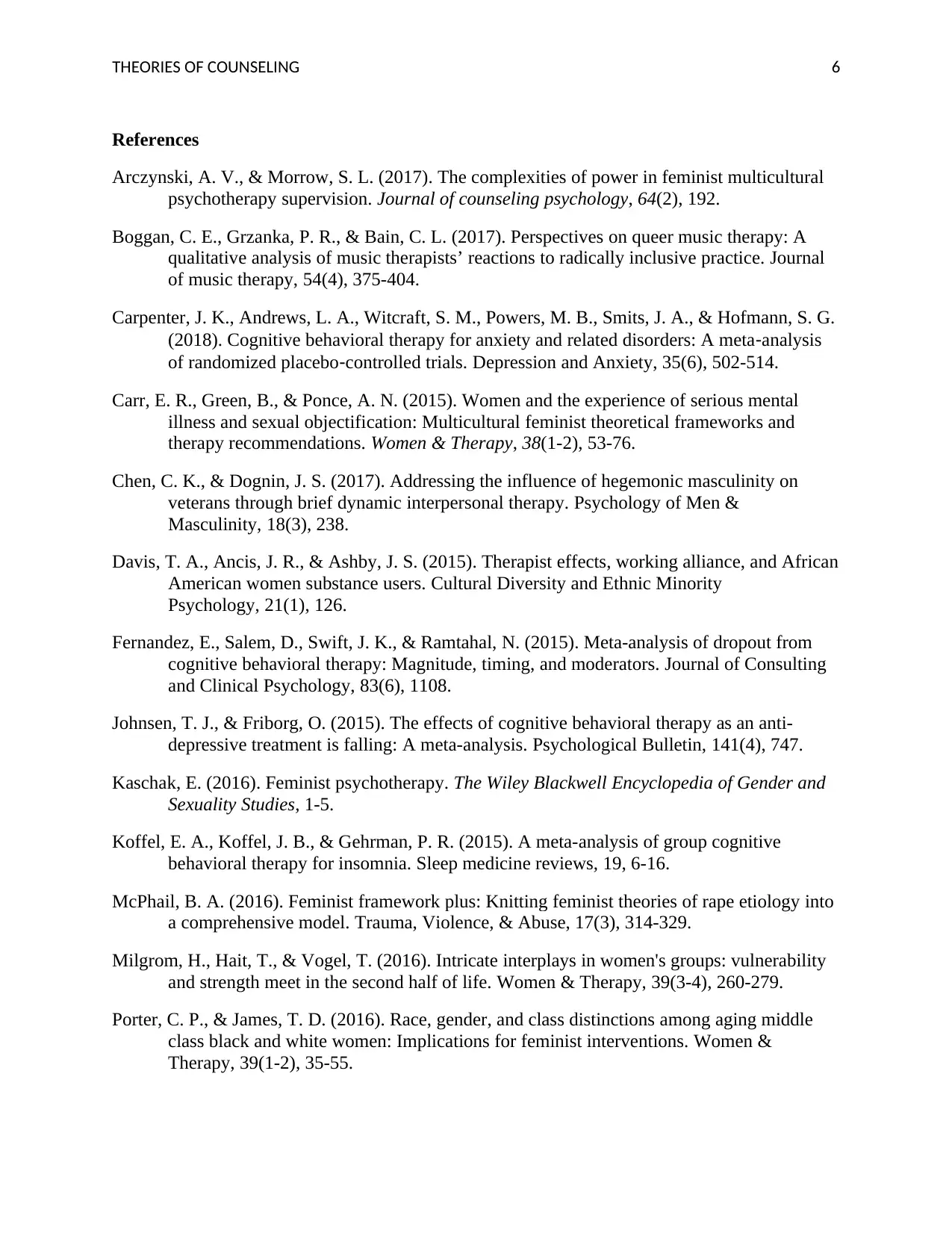
THEORIES OF COUNSELING 6
References
Arczynski, A. V., & Morrow, S. L. (2017). The complexities of power in feminist multicultural
psychotherapy supervision. Journal of counseling psychology, 64(2), 192.
Boggan, C. E., Grzanka, P. R., & Bain, C. L. (2017). Perspectives on queer music therapy: A
qualitative analysis of music therapists’ reactions to radically inclusive practice. Journal
of music therapy, 54(4), 375-404.
Carpenter, J. K., Andrews, L. A., Witcraft, S. M., Powers, M. B., Smits, J. A., & Hofmann, S. G.
(2018). Cognitive behavioral therapy for anxiety and related disorders: A meta‐analysis
of randomized placebo‐controlled trials. Depression and Anxiety, 35(6), 502-514.
Carr, E. R., Green, B., & Ponce, A. N. (2015). Women and the experience of serious mental
illness and sexual objectification: Multicultural feminist theoretical frameworks and
therapy recommendations. Women & Therapy, 38(1-2), 53-76.
Chen, C. K., & Dognin, J. S. (2017). Addressing the influence of hegemonic masculinity on
veterans through brief dynamic interpersonal therapy. Psychology of Men &
Masculinity, 18(3), 238.
Davis, T. A., Ancis, J. R., & Ashby, J. S. (2015). Therapist effects, working alliance, and African
American women substance users. Cultural Diversity and Ethnic Minority
Psychology, 21(1), 126.
Fernandez, E., Salem, D., Swift, J. K., & Ramtahal, N. (2015). Meta-analysis of dropout from
cognitive behavioral therapy: Magnitude, timing, and moderators. Journal of Consulting
and Clinical Psychology, 83(6), 1108.
Johnsen, T. J., & Friborg, O. (2015). The effects of cognitive behavioral therapy as an anti-
depressive treatment is falling: A meta-analysis. Psychological Bulletin, 141(4), 747.
Kaschak, E. (2016). Feminist psychotherapy. The Wiley Blackwell Encyclopedia of Gender and
Sexuality Studies, 1-5.
Koffel, E. A., Koffel, J. B., & Gehrman, P. R. (2015). A meta-analysis of group cognitive
behavioral therapy for insomnia. Sleep medicine reviews, 19, 6-16.
McPhail, B. A. (2016). Feminist framework plus: Knitting feminist theories of rape etiology into
a comprehensive model. Trauma, Violence, & Abuse, 17(3), 314-329.
Milgrom, H., Hait, T., & Vogel, T. (2016). Intricate interplays in women's groups: vulnerability
and strength meet in the second half of life. Women & Therapy, 39(3-4), 260-279.
Porter, C. P., & James, T. D. (2016). Race, gender, and class distinctions among aging middle
class black and white women: Implications for feminist interventions. Women &
Therapy, 39(1-2), 35-55.
References
Arczynski, A. V., & Morrow, S. L. (2017). The complexities of power in feminist multicultural
psychotherapy supervision. Journal of counseling psychology, 64(2), 192.
Boggan, C. E., Grzanka, P. R., & Bain, C. L. (2017). Perspectives on queer music therapy: A
qualitative analysis of music therapists’ reactions to radically inclusive practice. Journal
of music therapy, 54(4), 375-404.
Carpenter, J. K., Andrews, L. A., Witcraft, S. M., Powers, M. B., Smits, J. A., & Hofmann, S. G.
(2018). Cognitive behavioral therapy for anxiety and related disorders: A meta‐analysis
of randomized placebo‐controlled trials. Depression and Anxiety, 35(6), 502-514.
Carr, E. R., Green, B., & Ponce, A. N. (2015). Women and the experience of serious mental
illness and sexual objectification: Multicultural feminist theoretical frameworks and
therapy recommendations. Women & Therapy, 38(1-2), 53-76.
Chen, C. K., & Dognin, J. S. (2017). Addressing the influence of hegemonic masculinity on
veterans through brief dynamic interpersonal therapy. Psychology of Men &
Masculinity, 18(3), 238.
Davis, T. A., Ancis, J. R., & Ashby, J. S. (2015). Therapist effects, working alliance, and African
American women substance users. Cultural Diversity and Ethnic Minority
Psychology, 21(1), 126.
Fernandez, E., Salem, D., Swift, J. K., & Ramtahal, N. (2015). Meta-analysis of dropout from
cognitive behavioral therapy: Magnitude, timing, and moderators. Journal of Consulting
and Clinical Psychology, 83(6), 1108.
Johnsen, T. J., & Friborg, O. (2015). The effects of cognitive behavioral therapy as an anti-
depressive treatment is falling: A meta-analysis. Psychological Bulletin, 141(4), 747.
Kaschak, E. (2016). Feminist psychotherapy. The Wiley Blackwell Encyclopedia of Gender and
Sexuality Studies, 1-5.
Koffel, E. A., Koffel, J. B., & Gehrman, P. R. (2015). A meta-analysis of group cognitive
behavioral therapy for insomnia. Sleep medicine reviews, 19, 6-16.
McPhail, B. A. (2016). Feminist framework plus: Knitting feminist theories of rape etiology into
a comprehensive model. Trauma, Violence, & Abuse, 17(3), 314-329.
Milgrom, H., Hait, T., & Vogel, T. (2016). Intricate interplays in women's groups: vulnerability
and strength meet in the second half of life. Women & Therapy, 39(3-4), 260-279.
Porter, C. P., & James, T. D. (2016). Race, gender, and class distinctions among aging middle
class black and white women: Implications for feminist interventions. Women &
Therapy, 39(1-2), 35-55.
Paraphrase This Document
Need a fresh take? Get an instant paraphrase of this document with our AI Paraphraser
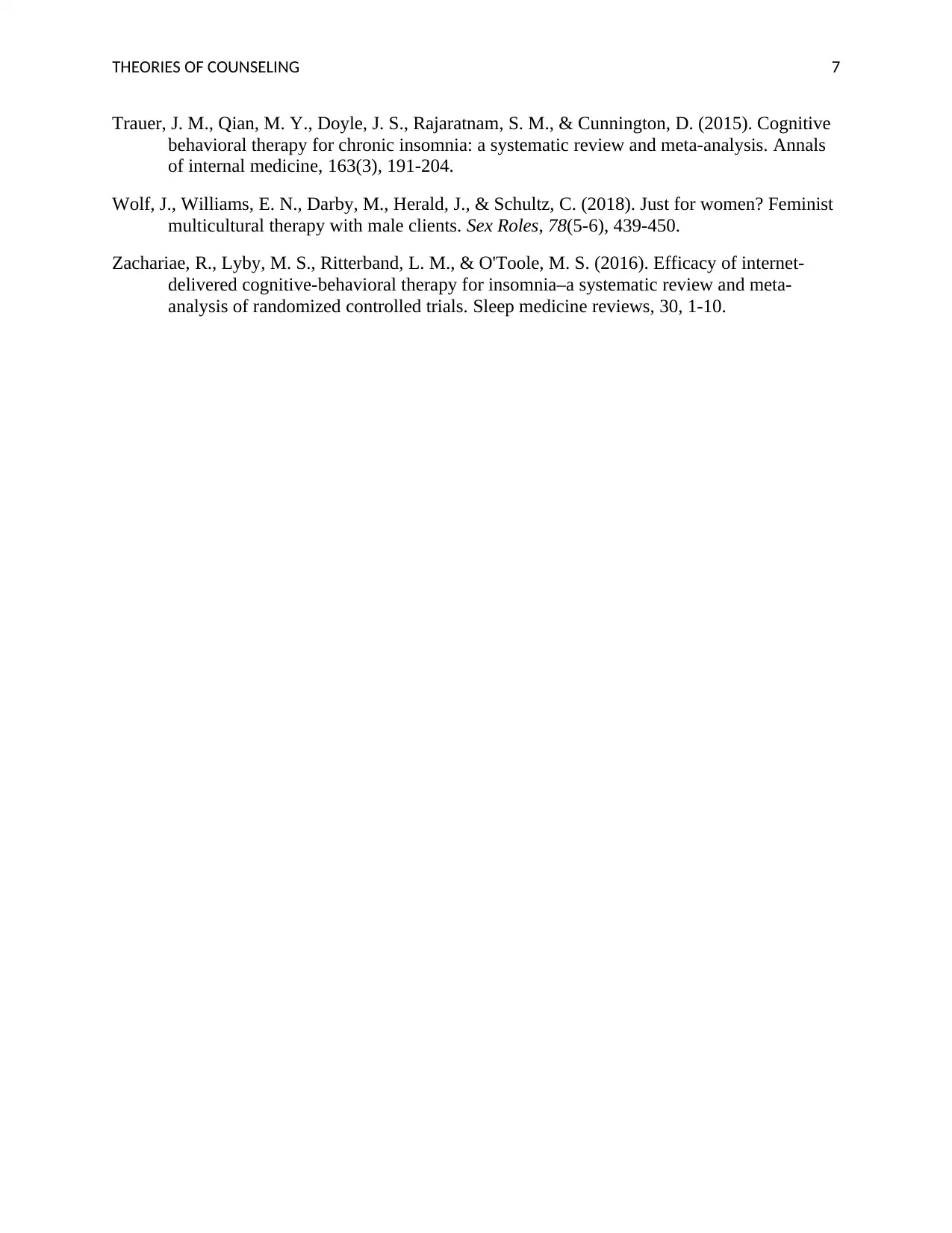
THEORIES OF COUNSELING 7
Trauer, J. M., Qian, M. Y., Doyle, J. S., Rajaratnam, S. M., & Cunnington, D. (2015). Cognitive
behavioral therapy for chronic insomnia: a systematic review and meta-analysis. Annals
of internal medicine, 163(3), 191-204.
Wolf, J., Williams, E. N., Darby, M., Herald, J., & Schultz, C. (2018). Just for women? Feminist
multicultural therapy with male clients. Sex Roles, 78(5-6), 439-450.
Zachariae, R., Lyby, M. S., Ritterband, L. M., & O'Toole, M. S. (2016). Efficacy of internet-
delivered cognitive-behavioral therapy for insomnia–a systematic review and meta-
analysis of randomized controlled trials. Sleep medicine reviews, 30, 1-10.
Trauer, J. M., Qian, M. Y., Doyle, J. S., Rajaratnam, S. M., & Cunnington, D. (2015). Cognitive
behavioral therapy for chronic insomnia: a systematic review and meta-analysis. Annals
of internal medicine, 163(3), 191-204.
Wolf, J., Williams, E. N., Darby, M., Herald, J., & Schultz, C. (2018). Just for women? Feminist
multicultural therapy with male clients. Sex Roles, 78(5-6), 439-450.
Zachariae, R., Lyby, M. S., Ritterband, L. M., & O'Toole, M. S. (2016). Efficacy of internet-
delivered cognitive-behavioral therapy for insomnia–a systematic review and meta-
analysis of randomized controlled trials. Sleep medicine reviews, 30, 1-10.
1 out of 8
Related Documents
Your All-in-One AI-Powered Toolkit for Academic Success.
+13062052269
info@desklib.com
Available 24*7 on WhatsApp / Email
![[object Object]](/_next/static/media/star-bottom.7253800d.svg)
Unlock your academic potential
Copyright © 2020–2025 A2Z Services. All Rights Reserved. Developed and managed by ZUCOL.





